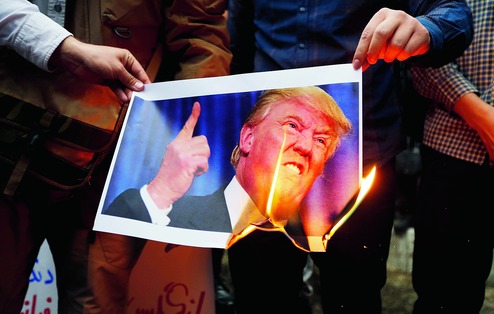
Washington: Dismayed European allies sought to salvage the international nuclear pact with Iran on Wednesday after President Donald Trump pulled the US out of the landmark accord, while Tehran poured scorn on the US leader.
"The deal is not dead. There's an American withdrawal from the deal but the deal is still there," French foreign minister Jean-Yves Le Drian said.
Iranian Supreme Leader Ayatollah Ali Khamenei, who had been reluctant to back the deal, said: "Mr Trump, I tell you on behalf of the Iranian people: You've made a mistake... I said many times from the first day: don't trust America."
Iran also signalled its willingness to talk.
Trump announced on Tuesday he would reimpose US economic sanctions on Iran to undermine what he called "a horrible, one-sided deal that should have never, ever been made", which was "defective at its core".
The fruit of more than a decade of diplomacy, the agreement was concluded in 2015 by the US, France, Britain, Germany, Russia, China and Iran.
It was designed to prevent Iran obtaining a nuclear bomb in return for lifting sanctions that had crippled its economy.
Trump complained that the deal, the signature foreign policy achievement of his Democratic predecessor, Barack Obama, did not address Iran's ballistic missile programme, its nuclear activities beyond 2025 or its role in conflicts in Yemen and Syria.
His decision raises the risk of deepening conflicts in West Asia, puts the US at odds with European diplomatic and business interests, and casts uncertainty over global oil supplies. Oil prices rose more than 2 per cent, with Brent hitting a three-and-a-half-year high.
The deal could also strengthen the hand of hardliners at the expense of reformers in Iran's political scene.
France's Le Drian, German Chancellor Angela Merkel and the International Atomic Energy Agency (IAEA) all said Iran was honouring its commitments under the accord.
"The region deserves better than further destabilisation provoked by American withdrawal," Le Drian said.
The EU said it would remain committed to the deal and would ensure sanctions on Iran remain lifted, as long as Tehran meets its commitments.
The Kremlin said Russian President Vladimir Putin was "deeply concerned" by the withdrawal, the RIA news agency said.
Merkel said that, while the existing deal should not be called into question, there should be discussion of "a broader deal that goes beyond it". British foreign secretary Boris Johnson spoke of a "follow-on agreement" but said it was now up to Washington to come up with concrete proposals.
Oil prices jump
Oil prices rose more than 3 per cent on Wednesday to threeandahalf year highs, after President Trump abandoned a nuclear deal with Iran and announced the "highest level" of sanctions against the Opec member.
Ignoring pleas by allies, Trump on Tuesday pulled out of an international deal with Iran that was agreed in 2015, a move that raises the risk of conflict in West Asia and casts uncertainty over oil supplies in an already tight market.
Brent crude oil touched its highest since November 2014 at $77.20 a barrel. The benchmark contract was up $1.90 a barrel, or more than 2.5 per cent, at $76.75 by 1335 GMT.
US light crude was up $1.70 a barrel, or almost 2.5 per cent, at $70.76, near highs also last seen in late 2014.
In China, the biggest single buyer of Iranian oil, Shanghai crude futures hit their strongest in dollar terms since they were launched.










